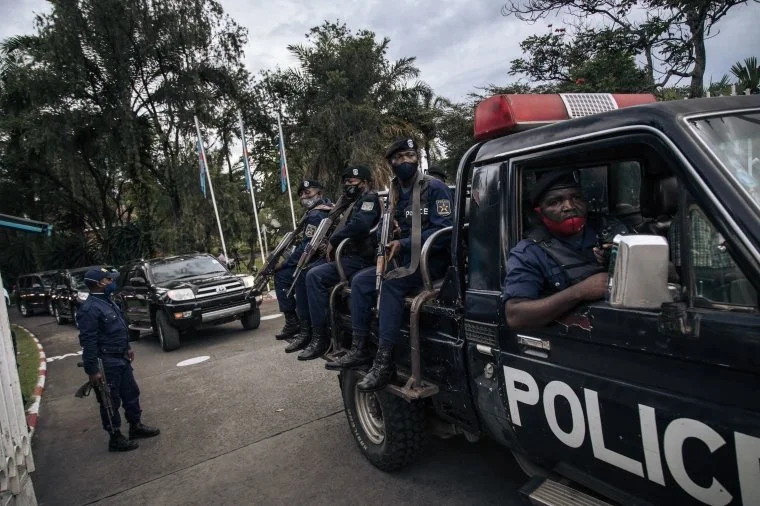The impact of Francois Beya’s arrest raised the fearsome prospect of the revival of a police state as epitomized under the Mobutu and Kabila regimes. Despite promising to turn the page on the horrors of yesteryears, and to drive the Democratic Republic of Congo in a new direction, President Tshisekedi has exhibited disturbing instincts throughout his first term.
Failure to protect press freedom
Pero Luwara was forced into exile after exposing corruption in the presidential family. The Committee to Protect Journalists reported that death threats had been directed at reporters Stanis Bujakera and John Lungila. In October, authorities tried to arrest Congolese journalist Steve Wembi, a well-known contributor to the New York Times and other reputable global outlets.
Soon after President Tshisekedi’s inauguration, he pledged to empower the media to become ‘a real fourth estate’. His promises, made on International Press Day, have been broken and the security situation for Congolese journalists is alarming. In November, the monitoring group Journalist in Danger (Journaliste en danger) reported at least 124 cases of threats, including instances of torture and arrests as well as physical attacks with at least one Congolese journalist being killed.
Most recently, Sonia Rolley was expelled from the country. She is well-respected in Congo, and to an international audience, with more than half a million people following her on social media on which she covers political events and exposes corruption and human rights abuses. With an approaching election, the expulsion of Rolley is a worrying manifestation – especially with the credible danger of electoral fraud happening again, which clearly occurred in December 2018 to elevate Tshisekedi to power in the first place.
Failure to respect human rights
‘I will humanize the security services’ was a campaign promise of Tshisekedi. In December, while being interviewed by Christian Lusakueno on Top Congo FM, then-candidate Tshisekedi proclaimed that all ANR (National Intelligence Agency) political holding cells would be closed and decommissioned.
Tshisekedi promised ‘Etat de Droit’ (rule of law) with five human rights priorities, including fighting impunity and strengthening mechanisms for the protection of human rights. Initially, positive steps were taken when as many as 700 political prisoners from the Kabila era were released, including prominent figures, Diomi Ndongala and Firmin Yangambi.
Nevertheless, Tshisekedi demonstrated his dictatorial zeal by making Francois Beya Kasonga the regime’s most emblematic political prisoner. Various analysts and reporters have speculated that the First Lady, Denise Nyakeru Tshisékedi, was behind this move. Numerous African and Western diplomats in Kinshasa recognized that Beya’s arrest was fabricated for personal and political reasons. The Free Francois Beya Kasonga Collective publication foretold the following in its letter from March 7, 2022, to Tshisekedi. The Collective pointed out that the ANR's investigations were mainly aimed at fabricating evidence and bribing people to testify against Beya.
Journalist Pero Luwara published the alleged assassination of William Ngoy and Ange Matondo. Both Matondo and Ngoy signed up to fabricate charges against Beya. There is a theory that the assassination of Matondo was executed in order to not expose ANR Director General Jean-Herve Mbelu and other co-conspirators surrounding the fraudulent coup d’etat – the false premise upon which Beya was arrested.
A climate of terror, created by the partisan security services, has continued as members of the Collective are now in hiding. Victor Tesongo, a spokesperson, has been forced into exile. Deputy spokesperson, Jean-Pierrer Mulumba and Sonia Lukusa, Beya’s communication advisor, are also in hiding and fear the worst. Other noteworthy political prisoners include national spokesperson for former President Kabila’s party PPRD and Jean-Marc Kabund-A-Kabund, a former UDPS acting president and vice-president of the National Assembly.
Failure of strategic foresight
Congo is also grappling with renewed fighting in its eastern region, as well as renewed tensions with Rwanda due to that regime’s backing of M23. Recently, the Rwandan-backed rebel group has killed over 300 unarmed civilians, according to numerous reports, including one from the United Nations Human Rights Office. The most recent killings took place between Nov. 28 and Nov. 30. The dysfunction within the Congolese intelligence services proved to be problematic for Tshisekedi. These failures have their origin in the illegal imprisonment and detention of Beya, Tshisekedi’s former ‘Gentleman Spymaster.’
‘By letting the M23 wage war … we should expect the amplification of acts of serious human rights violations’ quotes security expert Jean-Jacques Wondo. For Wondo, the massacres of civilians, committed by the M23 (and by extension, Rwanda) in Kisishe, were wholly predictable. Likewise, Congolese researcher, Stewart Muhindo Kalyamughumaz, recently penned an article illustrating the fundamental problems as they exist in DR Congo. Today, Tshisekedi seems to proclaim himself a doctor, but one who has never studied medicine; he is one who promises his patients to find a cure to all their problems, but he is undeniably out of his depth. For he cannot seek and administer the correct prognosis to find the appropriate solutions.
Given these mounting concerns that exist today, there is a need to empower the country’s beleaguered journalists – and pro-democracy community – so that they can adequately inform the voting public. This is, of course, critical given the upcoming election of December 2023. This is asking a lot of a media community that has been routinely besieged under the Tshisekedi regime. Nevertheless, this is the most important way to fight against the prepared fraud. It is indeed a matter of life and death for the Democratic Republic of Congo.
Do we move backwards to a bygone era of dictatorship? Or do we progress to the promises of a well-functioning and robust democracy that reflects the will and aspirations of the Congolese people?
Jean-Michel Nlandu is and activist and research, and the co-founder of The Collective to Free François Beya. Follow on Twitter @FreeBeya
DISCLAIMER: The views expressed in this publication do not necessarily reflect the views of Vanguard Africa, the Vanguard Africa Foundation, or its staff.

